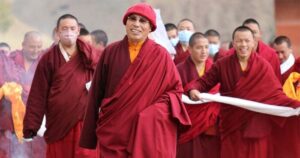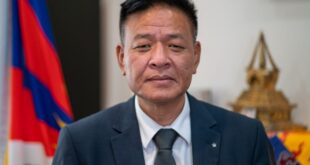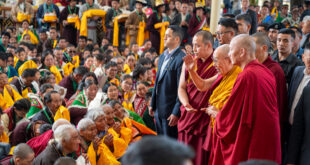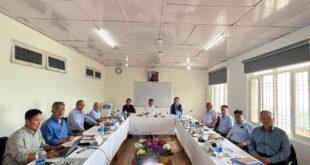 Dharasmhala: When His Holiness the Dalai Lama saw the faces of an array of police officers and staff of the Metropolitan Police on the screens before him this morning, he waved and greeted them warmly, “Hello, hello, hello”. Once he was settled in his seat, he remarked that while he’s used to getting up at 3.30 in the morning and having his breakfast at 5.30, they were probably not accustomed to being up so early with empty stomachs.
Dharasmhala: When His Holiness the Dalai Lama saw the faces of an array of police officers and staff of the Metropolitan Police on the screens before him this morning, he waved and greeted them warmly, “Hello, hello, hello”. Once he was settled in his seat, he remarked that while he’s used to getting up at 3.30 in the morning and having his breakfast at 5.30, they were probably not accustomed to being up so early with empty stomachs.
Moderator of the conversation, Ms Brin Deol, asked if His Holiness if he’d had a good birthday.
“Yes,” he replied, “but I feel each day is like a birthday. What’s important is your mental attitude. If you have a peaceful mind, every morning is like a birthday morning.”
Dr Kumanga Andrahennadi of the Centre for the Advanced Learning of Mindfulness (CALM) explained that for this special occasion they had organized 1000 police officers, staff and special guests to listen to what His Holiness had to say about compassion. She said they were truly grateful.
PC Brin Deol introduced the most senior officer present, Detective Chief Superintendent Simon Rose, a champion of ‘Shine’ within the Metropolitan Police and instrumental in organizing this event. He apologised for the absence of the Commissioner who had wanted to take part, but was unable to attend for other operational reasons. He explained that ‘Shine’ consists of a group of volunteers within the police who are interested in ways to enhance mental resilience and achieve peace of mind. It was they who had convened this gathering of officers and staff to learn about ‘Compassion in these Uncertain Times’ at 5.30 in the morning. But, he noted, they couldn’t have done it without Dr Kumanga Andrahennadi of CALM.
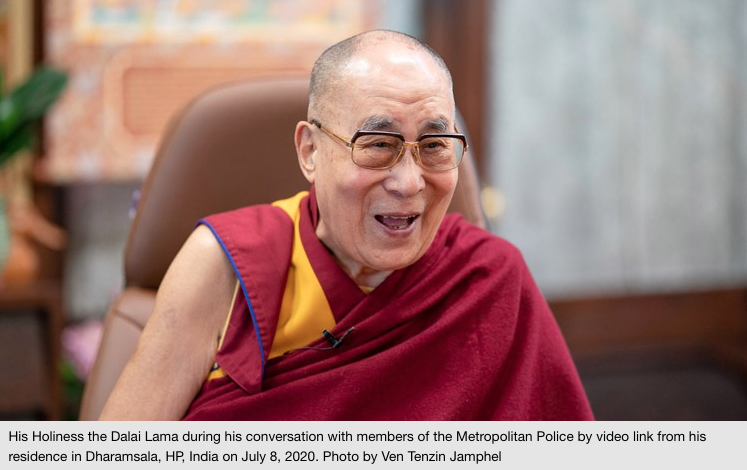 “We are policing in very challenging times,” DCI Rose told His Holiness, “when the importance of developing peace of mind and mental well-being is more relevant than ever.”
“We are policing in very challenging times,” DCI Rose told His Holiness, “when the importance of developing peace of mind and mental well-being is more relevant than ever.”
His Holiness replied, “I feel very happy and honoured to be able to speak to a group of British people like you. We Tibetans and Britishers have close historical links. On previous visits to England I’ve met people who were once posted in Lhasa.
“In 1904 a group of British soldiers reached Lhasa led by a man called Younghusband. They generally conducted themselves well, unlike, if I may say so, Chinese soldiers later on. The Dalai Lama had fled to Mongolia, but the Regent acting on his behalf offered a statue of the Buddha to Younghusband, which his family kept and have shown to me. He was impressed by Tibetans’ spirituality and set up his own spiritual organization as a result.
“During their rule in India, the British set up a mission Lhasa, with a British official always present. When a delegation from the mission came to see me as a young boy, they would bring me toys as gifts. So, whenever I heard the British were coming, I looked forward to seeing what they’d brought. And today, I’m very happy to have the opportunity of talking to all of you.
“In Asia there is a tradition of non-violence and compassion, ideas that have evolved over more than 3000 years. In today’s world these qualities seem more relevant than ever.
“Time is always moving on. But the important question is whether we use our time well or not. Responsibility for doing so rests entirely on our own shoulders. In the West a sense of materialistic thinking prevails. In Asia, notions of compassion and non-violence relate more to our inner world. Generally, we observe physical hygiene to protect our health. However, we also need to cultivate a sense of emotional hygiene. We may talk about securing peace in the world, but we won’t be able to do it without achieving peace within ourselves.
 “We must learn how to cultivate peace of mind, not in terms of prayers, rituals or seeking blessings, but in relation to how our minds work and how we can cleanse our destructive emotions.
“We must learn how to cultivate peace of mind, not in terms of prayers, rituals or seeking blessings, but in relation to how our minds work and how we can cleanse our destructive emotions.
“When they are young, children love to smile and readily respond to compassion. We must find ways to keep these qualities alive so they maintain a compassionate attitude and learn how to tackle anger as they grow up. Their time at kindergarten and in classes at school should include methods to achieve peace of mind and address emotions such as anger and fear.
“Quantum physics distinguishes between appearance and reality. Material things appear to exist solidly and objectively, but if we investigate them more deeply, that solid appearance vanishes. Destructive emotions are based on appearances. Compassion and altruism are rooted in reason. It’s our clinging to misconceptions about things that gives rise to such emotions as anger and fear.
“Our minds change from moment to moment. If you examine your mind, you find there’s nothing static to hang on to. Such analytical meditation helps us better understand reality. A clearer understanding of reality helps loosen and reduce our destructive emotions. And I take it as a hopeful sign that we can strengthen qualities like compassion by exercising reason. Positive emotions can be reinforced in meditation, while destructive emotions can be reduced.”
His Holiness explained that until late in the 20th century, scientists paid little attention to the mind. However, towards the end of the century interest grew not only in the brain, but in the mind too. With neuroplasticity it was discovered that meditation can affect the brain. He clarified that developing concentration is a way of calming the mind. The mind feels empty because there is no sensory input. As meditators gain experience they learn to focus on mental consciousness. His Holiness mentioned that he has friends who can maintain such focus for 3 – 4 hours.
He remarked that compassion is not a sensory consciousness. It belongs to mental consciousness. He added that scientists now accept that cultivation of compassion in meditation brings peace of mind and inner strength. Compassion can be extended through reasoning, whereas negative emotions such as anger and jealousy come and go and do not last.
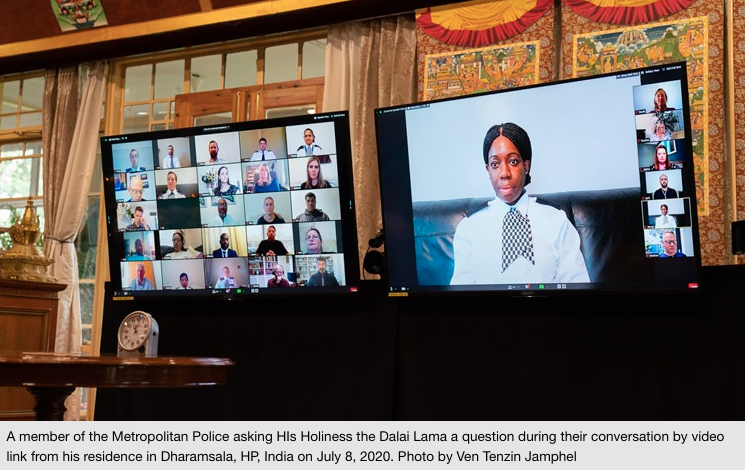 “I’m a monk following the Nalanda Tradition,” His Holiness continued. “This tradition is essentially about training the mind and there’s no reason it can’t be pursued in a secular context. It’s about improving our day to day lives here and now. I’ve been meditating on compassion for the last 50 years and as a result my blood pressure is never too high, I sleep soundly and my digestion is good. So, as far as I’m concerned, attaining peace of mind is good for my health.
“I’m a monk following the Nalanda Tradition,” His Holiness continued. “This tradition is essentially about training the mind and there’s no reason it can’t be pursued in a secular context. It’s about improving our day to day lives here and now. I’ve been meditating on compassion for the last 50 years and as a result my blood pressure is never too high, I sleep soundly and my digestion is good. So, as far as I’m concerned, attaining peace of mind is good for my health.
“In the last century war was rife and too much attention was spent on developing weapons, particularly nuclear weapons and other means of mass destruction. Increasingly people want to see these weapons eliminated. Violence continues to flare up here and there, but we can change that if we help people learn that violence is self-destructive and negative emotions can be tamed. Violence just leads to more violence. The only lasting solution is non-violence. We need to use our sense of reason to understand that because violence will not bring us what we want, we must aim to demilitarize the world.
“Many people now recognise that the seven billion human beings alive today are the same in being human. We live in a global society. Global warming, for example, is not limited by any national boundaries. To meet such challenges, we need to cultivate a strong sense of the oneness of humanity. Pursuing mutually agreeable solutions when conflict arises, we must make this a century of dialogue.
“We are social animals. Our very survival depends entirely on the community in which we live. If one person is committed to spreading the idea of non-violence it will affect the community, influencing the whole world to become peaceful and no longer violent. This is something I pray for.
“Education can make all the difference. Education in the West tends to have materialistic goals so what is needed is to combine it with education about our inner world and how we can achieve peace of mind. That’s all — thank you.”
Brin Deol thanked His Holiness and began to introduce those who had questions to ask. The first was about how to maintain peace and balance in the face of daily crime and conflict.
“It’s because we have neglected our inner world and an idea of inner peace that we now see a crisis in society. However, if someone is brandishing a weapon at you, you can’t just think ‘compassion, compassion’ to yourself. You have to take appropriate counter measures. In the long run, we have to educate people in general and teach them the benefit of inner values.”
A community police officer who told His Holiness that she had visited the temple near his residence in Dharamsala asked him to advise police recruits about keeping up their faith in humanity.
“You need to maintain a sincere motivation,” he told her. “And you need to have a sense of compassion for those who are causing trouble. If there is no other way to restrain the violent, you may have to adopt tough measures, but not at the cost of losing your own peace of mind. Sometimes people think of compassion as a sign of weakness. I consider it a sign of strength.”
A crime scene manager dealing with forensic investigations asked how to deal with the sad scenes she encounters.
“I always express my admiration for the European Union,” His Holiness remarked. “In the past and well into the 20th century the French and Germans regularly fought and killed each other. During the second world war Adenauer and de Gaulle were enemies, but when the war was over, they adopted a more mature approach and formed what became the EU. Since then, there has been no more killing among the member states. The point is to make a determination to reduce and end violence, as they did. That’s how we’ll create a more peaceful world.
“You mustn’t let the sight of violence make you demoralized. You have to be determined to bring about change. Destructive emotions are a result of ignorance, but with determination it can be overcome.”
Another London police officer wanted to know if His Holiness had ever doubted his role as a spiritual leader and how he would advise others who had doubts about themselves.
“I always think of myself as just one of the seven billion human beings alive today. I’m mentally, physically and emotionally the same as everyone else. But I consider myself fortunate to have been able to learn about the mind and disturbing emotions.
“In India we have many spiritual traditions and generally they live peaceably together. There are Hindus, Jains, Buddhists, Sikhs, Christians, Jews, Muslims and Zoroastrians all living together here. In India there are so many religious traditions, but all teach a common message of love. The idea that there is only one religion and one truth may work in isolated countries, but in today’s inter-related world we need to recognise several religions and several aspects of the truth. Since they all convey a message of love, we can learn to appreciate them all.”
A woman police officer sought His Holiness’s advice and encouragement for women in a male dominated organization. He told her that women are symbols of love. Mothers embody love and compassion.
“Sometimes I observe that if countries had more women leaders, we’d have a more peaceful world. In fact, when the present Prime Minister of Finland was recently sworn in and appointed women to key posts in her cabinet, I wrote to congratulate her.
“Scientists have found evidence that women are more sensitive to the feelings of others. Historically we see that the majority of warriors are men; even butchers tend to be men. Women represent a gentler approach. Therefore, wherever they work women should take a more active role in promoting love and compassion in relation to others.”
A safer schools police officer asked His Holiness for his advice for school children today. He answered that education should include instructions on how to exercise emotional hygiene — tackling destructive emotions and learning how to bring about inner peace.
“The real destroyer of our peace of mind, what undermines our health and well-being is anger and fear. We’ll achieve a healthier body and mind if we learn to cultivate compassion and forgiveness. One Indian master in the past indicated that our enemies can be our greatest teachers because it’s from them that we learn how to develop patience. As I’ve already mentioned, we need to combine modern education and its material goals with the ancient understanding of how to develop peace of mind in a secular way.”
A London sergeant wanted to know how to deal with suicide that is the single biggest killer of young men aged under 45 in Britain. His Holiness suggested that intense competition for largely material goals and a lack of patience leads to frustration that is expressed in suicide. Once more he recommended that education is a solution.
“Too many unfulfilled desires and frustration can end in suicide. However, in my life I’ve faced a lot of problems, but I think it’s education and learning to work with the mind that has made a difference for me.”
Invited to recommend meditation practices that working police officers could benefit from, His Holiness began by stressing the need to pay more attention to mental consciousness.
“Emotions are part of mental consciousness, as well as their antidotes. When you’re asleep and you dream there’s no sensory input. If you can become familiar with that, you can use it for meditation. In your waking state, in meditation, you can access your mental consciousness, without sensory distraction. When you ignore sensory input, the mind feels empty. If you focus on that there’s a sense of something missing. The mind appears like a mirror in which thoughts arise like reflections. Focus on that, to begin with for a few seconds, then a few minutes, a few hours and so on.
“Generally, in our materialistic way of life we are slaves to our sense organs, but they can’t develop wisdom and compassion. To do that you need to pay attention to mental consciousness. If you develop some concentration, it stills the mind and improves its power. And you can apply that effectively by engaging in analysis in a purely secular context.”
His Holiness told a questioner who asked how to remain positive in the face of criticism that he didn’t know.
“Sometimes the media like to focus only on the negative because it seems to be more attractive. They take what’s positive for granted. You can explain the truth of whatever situation you’re dealing with. Even in the Buddha’s time there were many monks, but some of them were just ill-informed. In any group of people there are always some who lack good judgement.
“Self-discipline is important. If you simply act out of fear of sanctions that may be taken against you, it can lead to hypocrisy. When you have the opportunity, express how you feel on the basis of your own self-discipline. If you have that, you’ll act properly whether someone else is watching or not. Take the short- and long-term consequences into account. If something seems temporarily satisfactory but harmful in the long run, don’t do it.”
The final question was put by a Tibetan police officer who asked how to maintain hope in these difficult times. His Holiness told him that all our physical and verbal actions relate to our mental actions. Therefore, if you have a good motivation and a sense of concern for others’ well-being, whatever steps you take will be beneficial.
Brin Deol on behalf of the organizers thanked His Holiness for his answers. She introduced another officer who had baked him a birthday cake. She told him it contained 85 petals to indicate his 85 years. He asked to see it and she lifted it up to show him. He smiled and made a gesture of eating and enjoying it.
“I really appreciate the deep feelings you’ve shown my brothers and sisters. We all have the same great potential and we should pay attention to developing it in a positive way. Thank you.”
Brin Deol thanked everyone who had made the event possible. Finally, she asked if His Holiness might be with them again. He told her he’d keep it in mind. He explained that because of his age he finds long flights difficult, but agreed that he’d be happy to see them again and visit other old friends, perhaps by travelling first to somewhere like Switzerland and going on to Britain from there. His final words were,
“We may be physically distant, but mentally we’re together. Thank you.”
